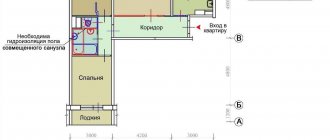Few landlords are happy to register tenants in their apartment. Many people are wary of this process, which is justified. Despite the fact that the law does not provide for the rights of tenants to claim real estate after registration, it is not always possible to evict them quickly and easily. Problems often arise.
But on the other hand, property owners do not always rent out apartments. Some are afraid of damage to their property, or simply do not want strangers to live. But at the same time they cannot refuse their relatives or friends to live for free.
If friends or relatives live in the apartment without registration
In principle, friends, relatives (not close ones - spouse, children, etc.), as well as tenants, are one and the same. If they live in your area, then you must register strangers in your apartment. After all, registration is required not only at the place of residence, but also at the place of stay.
Failure to comply with the rules for registration involves serious punishment (which is discussed below), which will befall not only the owner of the property, but also its residents.
So, what are the responsibilities of the owner, and what will happen for failure to fulfill them? The legislation distinguishes between such concepts as place of residence (this is the place where a person lives permanently or in the majority) and place of stay (here they mean a place of a temporary nature, for example, a person came to live for 2-4 months).
If you borrow from friends, be prepared to pay interest!
If you let a friend or cousin live in an apartment, and the period of stay is three months or longer, then the tenant must register at the place of his temporary stay. This must be done within 90 days from the date of move-in.
The fact of registration of a temporary nature is confirmed by a special form, which is issued by the local migration department.
If the tenant for any reason did not register, for example, he did not want to or simply did not have time, then the owner must independently notify the migration department about the tenant’s temporary residence in his living space. A period of three working days is given for this.
Rules for living in a rented apartment
Do not smoke in the room, kitchen, toilet
Smoking is allowed only on the balcony. Please note that apartments on Moskovskaya 240 and Ryleeva 3 do not have a balcony. There are balconies at Saltykov-Shchedrin and Karl Liebknecht. Please take this point into account when choosing an apartment.
Wash dishes and take out trash can
All apartments are cleaned by a cleaning lady before guests arrive. Her list of responsibilities does not include washing dishes and taking out trash for guests. We kindly ask you to perform these steps yourself in order to maintain cleanliness and order.
Don't make noise after 22:00
All apartments are located in apartment buildings. We ask you to respect your neighbors and the laws of the Russian Federation. In the event of a complaint from neighbors or police officers, we have the right to take measures to evict our guests.
Do not move furniture or interior items
If there is an urgent need for this, these actions are allowed to be done with prior agreement with the landlord. These measures are related to noise, damage to furniture and failure to return items to their original places.
Don't have noisy parties
Birthday parties and other events with alcohol consumption are prohibited. This is due to probable problems that arise everywhere with violation of all possible rules for the placement of guests.
Pets are not allowed
We are not haters of cats, dogs or other pets. Keeping an animal in a rented apartment often leads to property damage or pollution and noise. Please treat this with understanding.
Do not break objects in the apartment
Damage and disrepair of furniture, interiors and its objects cannot but cause our indignation. We ask you to take care of the accommodation provided to you. All controversial issues are resolved through conversation.
Follow the check-in schedule
Check-in to the apartment is carried out only after payment.
Services are not provided on credit. Check-in after 14:00, check-out from 9:00 to 12:00. Be sure to call 1 hour before check-in. Check-in is possible at any time, around the clock. In case of violation of one or more rules of living in an apartment, the landlord has the right to refuse to provide housing while retaining a deposit of 1,000 rubles. and payment for accommodation up to and including the day of eviction, as well as demand compensation for all material losses incurred due to the fault of the tenant. If you are not satisfied with one of the clauses of the rules, we can try to negotiate by phone if the clause is not critical for us.
When can you not register?
Registration is in most cases a mandatory process. It allows you to avoid negative consequences for the owner and tenant. But there are certain situations when it is not required:
- If the person has permanent registration in the same area. For example, a tenant will live in Moscow, but is registered in the Moscow region.
- If the occupant is an immediate family member. There is no need to register your spouse, child (including stepson or stepdaughter), your parents, grandchildren, grandparents.
Other cases require temporary registration. The term is determined by agreement between the owner and the tenant. When it expires, the registration is automatically canceled.
Pensioners, be prepared to receive compensation for major repairs
A temporary tenant does not have any rights to the property. Must move out immediately after the expiration of legal residence at the place of stay.
Rules of residence. What you can and cannot do in a rented apartment
Article on the topic
Count to three. Why can you be evicted from your apartment?
In accordance with the legislation of the Republic of Belarus, a rental agreement is a fundamental document that regulates the relationship between the employer and the lessor. A rental agreement is also a bilateral transaction, since its conclusion requires an agreed expression of the will of the two parties and this agreement establishes the rights and obligations for both parties.
Replacing the lock . Such a desire often arises in a tenant after signing a rental agreement, because it is unknown who rented this apartment before him. However, the owner usually requires a copy of the keys from the tenant, and this often causes disputes. The only way to save yourself the headache of duplicate keys is to think about this situation in advance and write it down in the contract.
The owner's right to visit the apartment may also become a controversial issue. Many owners, especially older people, like to periodically visit their rental apartment at any time and without warning. They enter all the rooms, make comments about unwashed dishes, uncleaned things, etc. Of course, this can't help but irritate.
The Housing Code does not contain a direct rule allowing the apartment owner to inspect the apartment and check its condition.
However, the tenant is obliged to use the apartment only for living, ensure its safety and maintain it in proper condition. Accordingly, the owner of the apartment has the right to demand that residents fulfill these obligations. It follows from this that the owner of the apartment has the right to check the condition of the apartment, however, the frequency and order of such inspections must also be agreed upon by the parties either through an oral agreement or by introducing appropriate conditions into the contract.
The ban on animals and children must also be agreed upon in advance. If you don’t have a child or a pet yet, but you are going to rent an apartment for a long time, of course, it is still better to inquire in advance about the attitude of the owners towards them.
drill into walls or throw out the owner's furniture in an apartment without the owner's permission. Repairs to premises leased can be carried out by both the tenant and the landlord. This must be clearly stated in the contract. As a rule, contracts provide for the obligation of the tenant to carry out routine repairs and the lessor to carry out major repairs.
Therefore, if you want to change linoleum to parquet in a rented apartment, coordinate this with the owner in advance. Otherwise, be prepared for the fact that no one will reimburse you for the cost of parquet.
The owner of the apartment must repair the owner's plumbing, refrigerator, stove, and electric bell. The tenant is a “temporary owner”, so he is responsible only for those problems that occurred through his fault. This is especially important when a pipe in the apartment bursts and floods the neighbors. If it is determined that the pipe burst in the owner’s apartment, then he will pay for the repairs to the neighbors. Now, if repairs had to be done because you forgot to turn off the tap, and as a result the neighbors were flooded, then it would be a different matter.
The tenant has no right to accommodate friends and relatives in the apartment The tenant is obliged to use the residential premises in accordance with the terms of the rental agreement. At the same time, the tenant does not have the right to transfer this right to other persons without the consent of the landlord.
A tenant does not have the right to set up a warehouse or office in a rented apartment The Housing Code provides for the obligation of the tenant to use the apartment only for living, and its violation may serve as a reason for early termination of the rental agreement.
If the tenant does not use the property in accordance with the terms of the rental agreement or the purpose of the property, the lessor has the right to demand termination of the contract and compensation for losses.
In the event of a fire, it is also important to determine the culprit, and if the employer is at fault, then he bears responsibility. However, difficulties may arise here. The fact is that most rental agreements are not registered with government agencies, which means that the court may recognize them as not concluded.
How not to make a mistake when choosing a future tenant
Be as careful as possible when showing the apartment to potential tenants. Don’t leave a person alone, otherwise you risk missing something. All meetings with tenants should take place during the day, and it is also advisable for one or two members of your family or friends to be present in the apartment. Everyone should come for an examination 10-15 minutes after the previous one. Firstly, this time is enough for the tenant to decide whether they want to live in your living space. If he prefers to think and leaves, this time will be enough to look around the apartment and check if anything is missing. And the understanding that someone else is applying for housing in this apartment will spur the person to make a decision in your favor.
A large number of people willing to rent your living space can serve you well. If there is a slight rush, you can slightly increase the cost of living. But don't overdo this desire.
Evaluate your potential home carefully. From random conversations on the phone or with you, you can understand whether a person is actually as solvent as he says he is. He may leave your apartment in a month because he will not be able to continue paying rent. And you will receive telephone and utility bills as a gift from the tenant.
Do not be squeamish or prejudiced towards people of other nationalities. You shouldn’t measure everyone with the same brush and naively believe that representatives of a particular nation are unscrupulous or dishonest with their payments. All people are different, their decency can be judged by their actions, and not by belonging to any nation or race.
You can distinguish a responsible and law-abiding citizen from a fraudster already at the first meeting with him. In fact, all tenants are divided into several groups:
- People who came to the city for a better life. This group includes citizens of the CIS, young families and students receiving education in this city. Russians can do their own registration, but you will have to do the registration of CIS citizens yourself. You should do this as quickly as possible, because friendly neighbors can at any time inform law enforcement agencies that a “guest worker” lives in your apartment, and you will have to answer for this to the fullest extent of the law.
- People who moved to the city for permanent residence. Such people are less demanding in matters of quality of living conditions; they are interested in the cost of living. Typically, this category of tenants does not have any large incomes, and they are not permanent, so you cannot count on them staying in your apartment for a long time.
- Settled newcomers. This category of people includes people who have settled in the city for a long time or people who have lived in it since birth, but for some reason do not have their own home. It is these tenants who are the most desirable tenants for landlords. They strive to live in comfortable conditions and pay a reasonable price for it. They are not afraid of the average market price; they want to live in good conditions. People in this category are characterized by instability. Some people first quarrel with their loved ones and rent an apartment, then they make peace and move out, some people run out of money, but don’t want to earn money for the next month, it’s easier to move home again. This is precisely what distinguishes them from visitors, who have nowhere to go and are forced to live in the conditions that they themselves chose.







